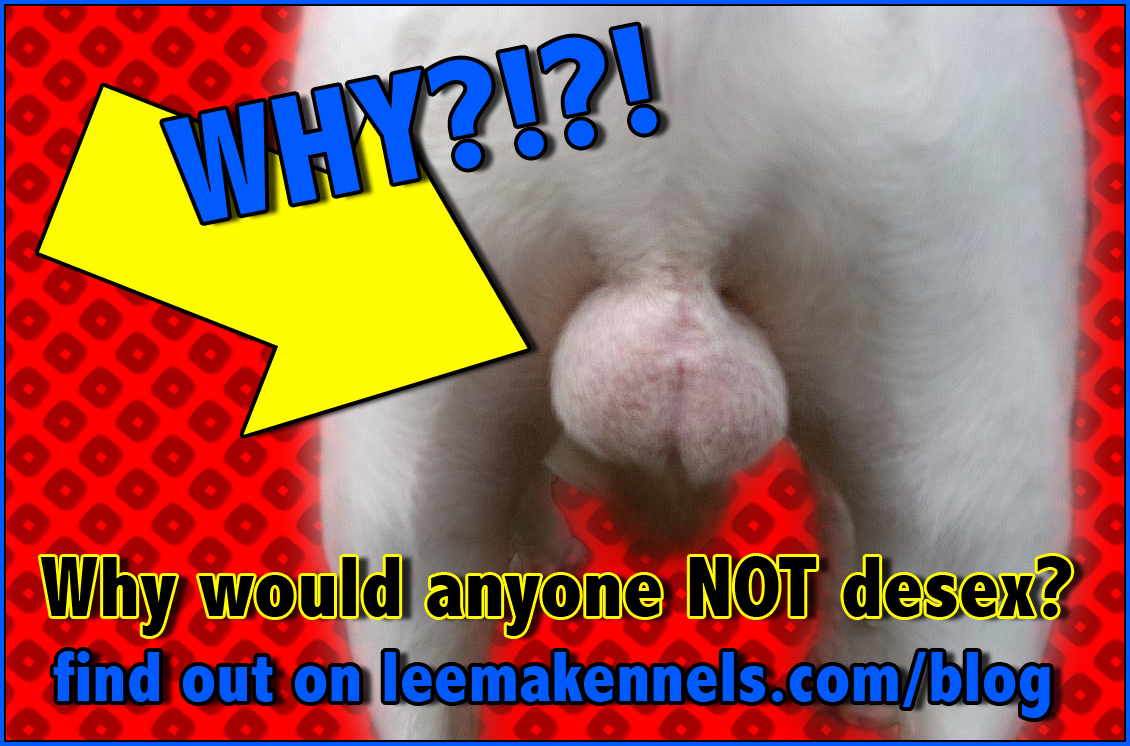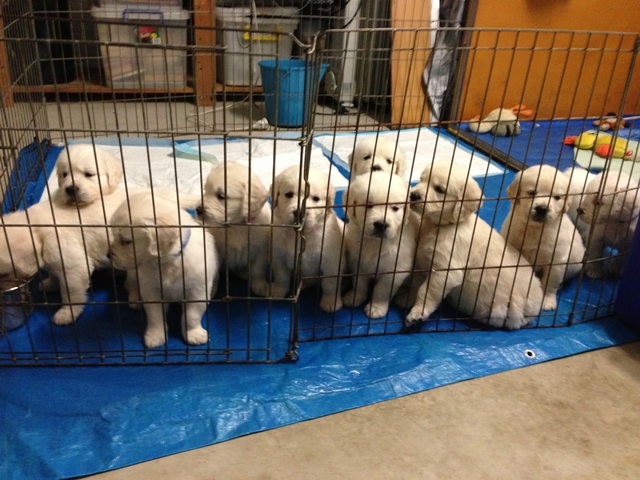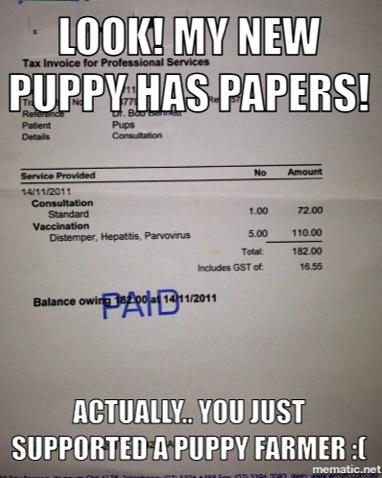There are a lot of people who love dogs. They may express this love in many different ways: some people own many dogs, some people make donations to important dog causes, young children may adorn their lockers with images of dogs, others may find their joy in training dogs for specialised tasks. While this expression of love is wildly different, there is no denying the central thread: a love of dogs. This love makes up the dog world.
But there’s division in the dog world.
There is a perpetuated myth that dog lovers who engage in dog rescue are some how more experienced, or compassionate, or just better than people who breed dogs.
There is a theme: the dog rescuer versus the dog breeder.
Sometimes the expression of this phenomena is not even subtle:
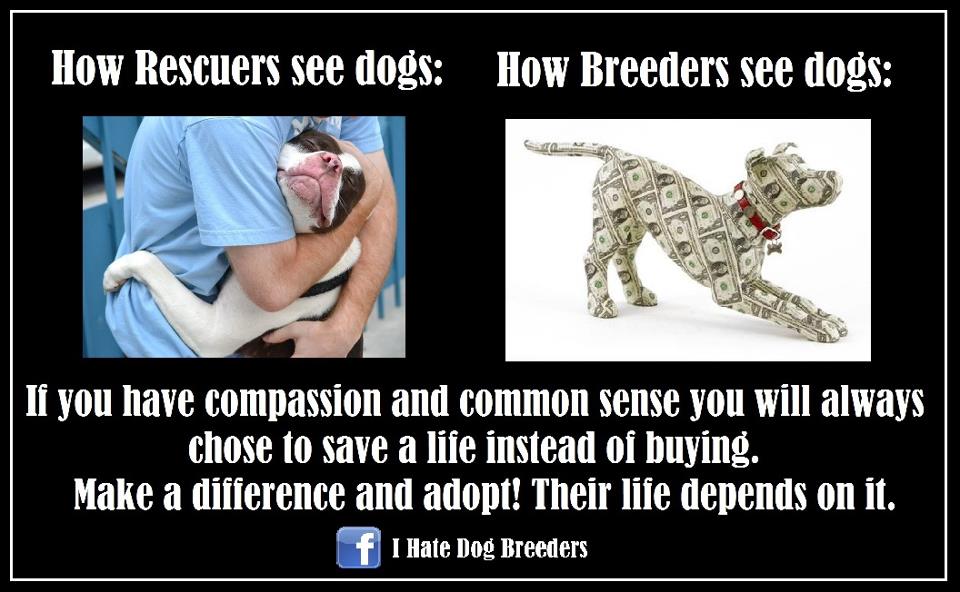
During Facebook discussions, I see people describe themselves as a ‘rescuer’ or as a ‘breeder’, and therefore differentiate themselves from others in a conversation. Like this:

As you can imagine, the term ‘breeder’ is sometimes used interchangeably with offensive terms like ‘greeder’, or ‘producer’, and then these are also used to delegitimise the experiences of the breeder in hand.
Like the rescue group below (another screen shot from Facebook, in regard to ‘Desex the bad ones!‘):

It’s frustrating when I criticise proposals like the Select Committee Recommendations in SA, or the Breeding and Rearing Code in Victoria, to be told that my biased because, as a breeder, the recommendations would influence my ability to make a profit. Anyone reading my blog would find that I object to many government recommendations for a variety of reasons – not one of them is “because it’ll be harder and more expensive for me to breed puppies”.
This divide in the dog world is not just seen online and on Facebook. I have blogged before on The Sin of Breeding Dogs and the judgement I receive for being a breeder when out and about.
Let me share a secret: No one wants to see dogs euthanised in shelters.
When talking about ‘rescue vs breeders’ on Facebook, Allie, from Maggie’s Farm, said:
I don’t think it’s particularly helpful to talk about “breeders” and “rescuers” because it kind of presupposes two homogenous groups, which isn’t the case. Among some breeders, “rescuers” are “animal rights” people, which to them is like a dirty word. And to some people in rescue, breeders are terrible, selfish people who make more dogs, when they are already dogs needing homes. And implying that there’s some zero sum game here, where a breeder bred and bought dog means a shelter dog dies. It’s not that simple. I think people who fall into both groups can be guilty of alienating the other, because it’s easy to have someone to blame and dislike.
Allie is of course right. There’s not just two groups in the dog world – the dog world is an amazing assortment of people with differing interests and passions. It is this very stuff that unites us.
What unites the dog world?
Comments and images, like those used above, are made like there is no glue in the dog world – and no potential for cohesion. It builds up a divide and splits the dog world into different sides. Our compassion and passion for dogs and their welfare unites the dog world, and this similarity should be embraced, not diminished.
The fact is, there are many in the dog world that bridge both sides. For example, I worked at a shelter for 3 years, have fostered about 45 animals in the last 5 years, and yet I also breed dogs. These roles aren’t in contradiction. I actually really like dogs, in all forms, and so fill up my life with them.
But, in conversations like that above, the dog world is polarised – between rescue problems, morals, and ethics and those of breeders. Between ‘the rescuers’ and ‘the breeders’. As Allie pointed out, it’s not as simple as that – the groups aren’t homogenous.
This terminology stops rescues and breeders being united and does nothing for animal welfare.
The divide impacts upon animal welfare
Rescuers and breeders have different skills and expertise. They have a lot to offer one another. I think it is important for us to recognise how animal welfare could be improved if we were to work more tightly together.
- Rescues are often key in finding purebred dogs in rescues and returning them to their recognised breeder. Sometimes, without ethical rescues, ethical breeders would never have the chance to get their dog back. This is a win for rescue, too: one less dog in the rescue system as ethical breeders will take back dogs in need.
- Breeders are an excellent knowledge base for rescues, especially when it comes to matters concerning newborn puppies, or when it comes to breed specific knowledge. As a personal example, when my bitch Clover whelped a singleton litter, she then fostered 9 day old rescue puppies as well. My knowledge as a breeder was important to these puppies as they arrived emaciated, dehydrated, and practically dead. On the flip side, because rescue entrusted me with these puppies, I learnt a lot that I didn’t already know.
- Breeders often have a list of people interested in dogs, and receive puppy and adult dog enquiries on an ongoing basis. Letting breeders know about dogs locally who are somewhat ‘like’ their breed (in looks or temperament) may mean that breeders can refer enquiries to rescues.
Currently, breeders criticise rescue and rescuers criticise breeders. This is not good for anyone. Having a reciprocal relationship is, obviously, much more desirable. Quite simply, by not tapping into shared passions and shared resources there is a risk of opportunities being lost.

Celebrate those uniting factors
Guess what?
Both rescuers and breeders love dogs.
Both rescuers and breeders want to see animal welfare improved.
Neither breeders or rescues want to see shelter euthanasia at its current level.
Both want to keep dogs out of pounds and rescues to start off with.
There is a lot in common that we can use to our advantage, moving forward.
How can breeders work with rescue?
If you’re a breeder, you can:
- Contact your local rescue group and see what areas they need help.
- Provide breed-specific advice to rescue groups or adoptive families.
- Foster or kennel dogs in need.
- Donate information that you’ve designed for your puppy packs.
- Make a monetary donation.
- Offer to groom rescue dogs.
- Offer to transport rescue dogs (especially if you’re travelling interstate to dog show events or for servicing a bitch).
- Share your local rescue group’s dog for adoption, including with those that enquire wanting a purebred – their perfect dog may just be in the local shelter.
- Make efforts to stay in touch with your puppy buyers to ensure that your puppies stay out of the rescue system.
- Educate yourself on the rescue and sheltering system.
- Congratulate and support those who choose to adopt a dog.
- Do not take a ‘breeder’s side’ by default – recognise the diversity among breeders and feel free to criticse unethical breeders, as well as celebrating ethical rescues.
How can rescues work with breeders?
 If you’re a rescue, you can:
If you’re a rescue, you can:
- Contact breeders to see if they can help with boarding or fostering rescue dogs.
- Ask breeders to share rescue dog’s availability with puppy enquirers.
- Avoid posting breeder-slamming content (like that on the right) on social media (or anywhere else).
- If you can identify the breeder of a dog in care, please contact the breeder – it’s their baby, too.
- Utilise breeders as a resource – especially when it comes to rearing baby puppies or breed-specific advice.
- Becomes informed on what ethical breeding practices look like, and support ethical breeders.
- Support those who choose to purchase a dog from an ethical breeder.
- Don’t take the side of ‘rescue’ by default – criticise unethical rescues as well as celebrating ethical breeders and other ethical rescues.
Moving Forward
When I asked about this topic on Facebook, one of my friends said,
There are ethical and unethical people on both sides, reasonable and unreasonable. I believe the ethical and reasonable can effectively work together in the best interest of dogs, the other side there isn’t much you can do about it.
Only those who are ‘reasonable’ and ethical will understand what this post is getting at.
Overall, we need both rescue and breeders to promote ethical places to acquire dogs from:
- From a registered breeder
- From a private rehoming
- From an ethical rescue
We are all passionate about dogs and their welfare. So; Let’s focus on the dogs, and not each other.
Further reading:
Our dogs are our beloved companions 98% of the time (written by a breeder)
I love dog breeders.
Patricia McConnell on Breeders Versus Rescues (Responsible breeding – an oxymoron?).
It’s become fashionable to hate dog breeders.
I hate dog breeders.
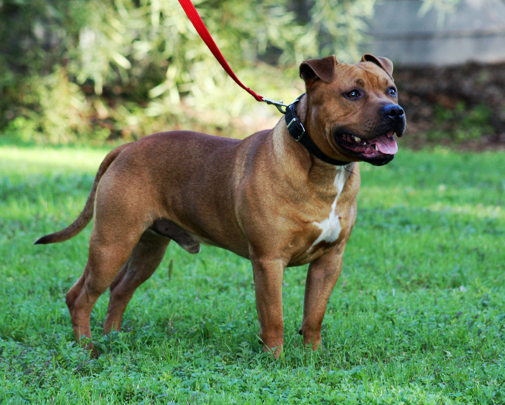





 If you’re a rescue, you can:
If you’re a rescue, you can: